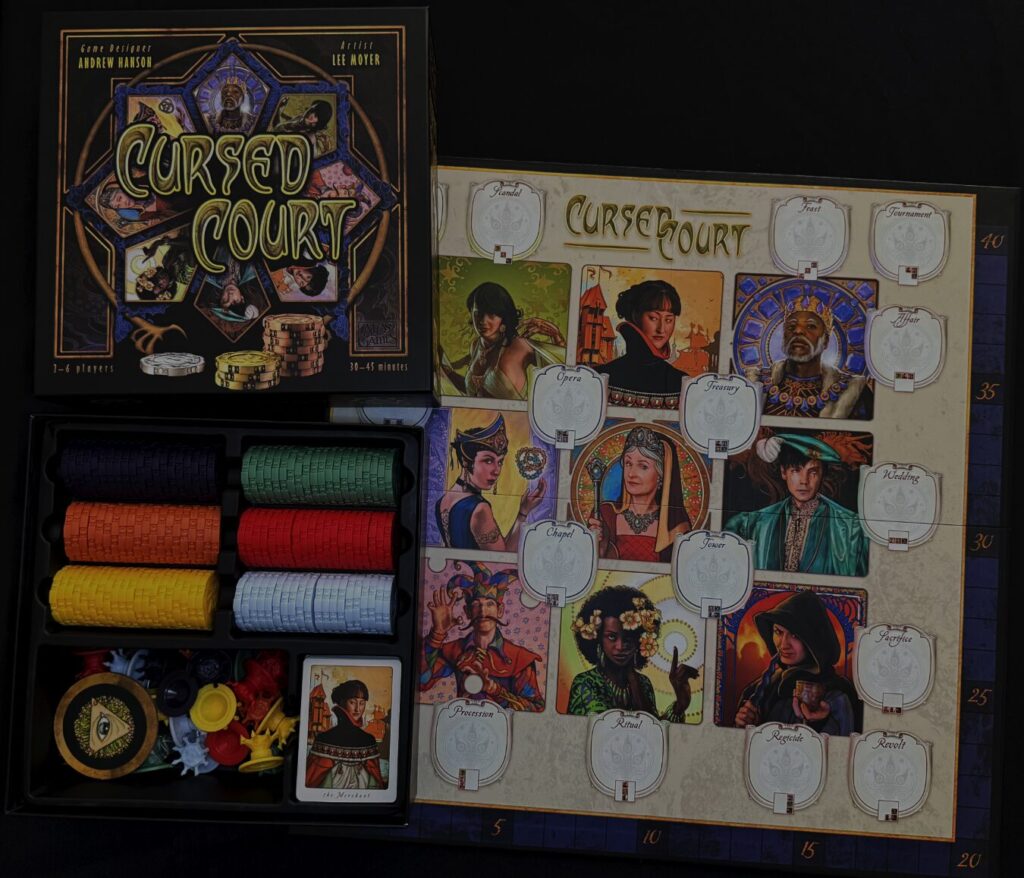
A friend of mine recently promoted Cursed Court in their newsletter. After watching a quick how-to-play video, I was immediately hooked.
This is a 2-6 player game (which requires modifications for small player counts). And it looks like it really sings at the higher end of player counts.
Game Summary
Basically, it’s a sort of reverse-roulette gambling game. There is a 3×3 grid of Nobles who you are betting on having influence. You’ll deal a card between each player as hidden information, and a player may look at their adjacent cards. You can bid on nobles individually, or as pre-defined sets of three or four. In total, there are 27 possible betting spots.
You turn up a new public-information card at the beginning of each “season.” Each player will place a single bet per season. After four seasons you’ve completed a “year,” at which point you it’s time to count your score. Play three years, tally points, and you’re done. Simple enough.
Then, you have 20 coins per year to defend your bets, and this is where it starts getting tricky. Each player gets to finalize one bet per season. Since there is hidden information, there is a lot of space for both bluffing and poker-style probability calculations. For instance, if you know there are two Magician cards face down adjacent to you, you may be inclined to bet on it with a lot of coins for a highly defended bet. But, if no further Magician cards come up in the open, it may end up being of middling value for the defensive resources you allocate.
It’s not all just math!
Alternately, you may end up liking the implied lore of the set bets and play to the narrative of the game. Each of the nobles is involved in five or six different sets that tell a thematic story based on what cards come up. For a very focused mathematical game at its core, the stories are surprisingly potent.
Each year brings a clean board-state, and everyone gets all their resources back. Besides the overall score, you now get a new opportunity to iterate on your strategy. Is the person across from you likely to bluff? Is your neighbor content to get pushed out and keep coins for a dominating bump towards the end of a year? After our first game completed, we were all ready to play again immediately, which always feels like a really good sign.
Conclusion
This game is really easy to teach, scales nicely, and is exquisitely replayable because it relies heavily on the individual players in the game and not just the math. My main complaints are that the theme is fairly disconnected from what the players do in the game. Plus, restarting each year of the game fresh is not exactly congruent with the court politics theme. But ultimately, Cursed Court is very satisfying and a worthy addition to my shelf.
If this game appeals to you, you may also enjoy our game Gorgon’s Garden, which is coming to Kickstarter in Fall 2025.
